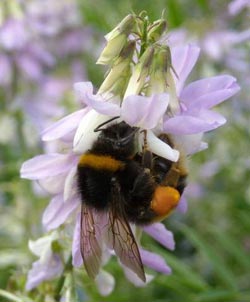Stress a key factor in causing bee colonies to fail

Extended periods of stress can cause bee colony failures, according to new research from Royal Holloway University. Credit: Nigel E. Raine<br>
The results showed that exposure to pesticides at levels bees encounter in the field, has subtle impacts on individual bees, and can eventually make colonies fail.
This discovery provides an important breakthrough in identifying the reasons for the recent global decline of bees, a trend that has baffled many experts worldwide.
“One in three mouthfuls of our food depend on bee pollination,” said lead author, Dr John Bryden from the School of Biological Sciences at Royal Holloway. “By understanding the complex way in which colonies fail and die, we've made a crucial step in being able to link bee declines to pesticides and other factors, such as habitat loss and disease which can all contribute to colony failure.”
“Exposing bees to pesticides is a bit like adding more and more weight on someone's shoulders. A person can keep walking normally under a bit of weight, but when it gets too much – they collapse. Similarly, bee colonies can keep growing when bees aren't too stressed, but if stress levels get too high the colony will eventually fail,” added Dr Bryden.
“Our research provides important insights to the biology of pollinators,” said co-author Professor Vincent Jansen. “It is intriguing that the way in which bees work together is the key to their success, but could also contribute to their decline and colony failure.”
The research was funded as part of the £10 million 'Insect Pollinators Initiative,' set-up to understand the causes of pollinator declines and safeguard future pollination services.
“Pesticides can have a detrimental effect on bees at levels used in the field,” said co-author Dr Nigel Raine. “Our research will provide important evidence for policymakers. The way we test pesticides, the way we assess their impact on bees, and the way we manage pesticides can all be improved.”
Media Contact
More Information:
http://www.rhul.ac.ukAll latest news from the category: Life Sciences and Chemistry
Articles and reports from the Life Sciences and chemistry area deal with applied and basic research into modern biology, chemistry and human medicine.
Valuable information can be found on a range of life sciences fields including bacteriology, biochemistry, bionics, bioinformatics, biophysics, biotechnology, genetics, geobotany, human biology, marine biology, microbiology, molecular biology, cellular biology, zoology, bioinorganic chemistry, microchemistry and environmental chemistry.
Newest articles

High-energy-density aqueous battery based on halogen multi-electron transfer
Traditional non-aqueous lithium-ion batteries have a high energy density, but their safety is compromised due to the flammable organic electrolytes they utilize. Aqueous batteries use water as the solvent for…

First-ever combined heart pump and pig kidney transplant
…gives new hope to patient with terminal illness. Surgeons at NYU Langone Health performed the first-ever combined mechanical heart pump and gene-edited pig kidney transplant surgery in a 54-year-old woman…

Biophysics: Testing how well biomarkers work
LMU researchers have developed a method to determine how reliably target proteins can be labeled using super-resolution fluorescence microscopy. Modern microscopy techniques make it possible to examine the inner workings…





















